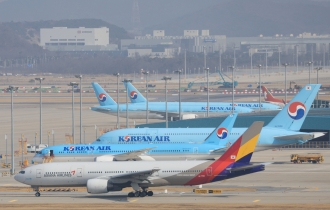Will Google, Apple be more transparent in tax?
[THE INVESTOR] Last October, spectators and watchers at home got a handful while viewing the parliamentary audit, as the founder of the country’s largest portal lodged a public full-on attack against his global rivals.
“Google and Facebook make good money here but don’t pay taxes and create no jobs,” Lee Hae-jin had said, as he was responding to criticisms from lawmakers of company’s own alleged abuse of market dominance.

He was effectively diverting attention away from Naver’s alleged influences on news circulation to reverse discrimination against Korean firms, saying stricter regulations are imposed on local firms while foreign firms enjoy tax pass-through advantages without having any social and economic responsibilities.
Lee’s offense against Google soon lost steam as the counterpart chose to stay mostly mute, but it has brought, once again, into light the operating status of global firms doing successful businesses in Korea.
Currently, many of the global firms here are registered as a limited liability company, a form of business organization without obligation to have external audit or disclose their financial information. They include Korean arms of Google, Apple, Facebook, Microsoft, HP, Louis Vuitton, Gucci, Pizza Hut and Coca-Cola.
They file their taxes to authorities but no one knows whether their reported information is accurate to a tee because they do not have to have external audit.
Lawmakers have long been demanding “better transparency” for the global firms, and they passed the revision of external audit law last year to force limited liability companies to have external audit and disclose their financial information such as sales, operating profits, net profits, dividend and taxes. The revised law is expected to be implemented in November of next year.
“Things will change as the revision of the external audit law is implemented. With the revised law, global firms will be having more eyes watching them,” said Park Yoon-jong, CEO of local Anse accounting firm.
Local experts, including Park, call for tougher regulations citing there is room for companies to exploit legal loopholes.
The revision, whose scope and range are not yet fixed, may provide exceptions for companies based on the number of employees or sales.
For instance, local arms of Google, Apple or Facebook, whose numbers of employees are relatively small compared to their sales generated here, may be excluded. Or the firms can simply change their entity type. These are, to some hardline watchers, still too large a loophole.
”The revision of the law can be makeshift. The best way is to make all companies have external audit regardless of their entity type and then grant an exception if necessary (to small firms for instance),” said Choi Min-sik, a professor lecturing in intellectual property rights at Sangmyung University.
Currently, the companies subject to external audit follow positive list approach, which means the subjects are only confined to listed companies, stock companies with more than 12 billion won (US$11 million) in asset or stock companies with more than 300 employees. Choi contended such positive list approach should be changed into negative list approach to include all the companies doing business activities in order to prevent companies from exploiting any legal loophole.
The limited liability firms were originally designed to protect firms’ partners from personal liability for the business’s debts. It was initially confined to companies with less than 50 employees.
But, when the limitation of the number of employees was abolished in 2011, many foreign firms changed their entity type into limited liability firms to benefit from not disclosing financial information. The number of the limited liability firms rose 122 percent from 12,091 in 2005 to 26,858 in 2016.
Many global firms, however, have long faced criticism for being elusive in paying taxes even though most of their dividends and royalties are flowed out of the nation that could otherwise lead to investments of jobs.
The foreign firms paid dividends twice local firms but invested half of them last year, according to corporate information provider CEO Score.
“Korea gives handsome benefits with relatively lax regulations to global firms to attract them. However, many of them were found to enjoy the benefits only and give less social contribution such as donation, hiring or investment,” said Park Ju-gun, head of corporate analysis firm CEO Score.
By Shin Ji-hye/The Korea Herald (shinjh@heraldcorp.com)
EDITOR'S PICKS
- Seoul shares rattled by Israeli attack on Iran; Kospi dips to nearly 11-week low
- S-Oil donates W560m to support firefighters
- LG CNS teams up with Yonsei University to nurture AI specialists
- Polestar 4 to make Korean debut in June
- S. Korea pledges W23tr venture capital fund for green investment at G20 meeting
- Sungsimdang outperforms bakery giants to log sales over W100b
- France rejects opening Paris flight routes to T'way Air, deals blow to Korean Air merger
- SK hynix chief underscores chip cooperation between Korea, US















